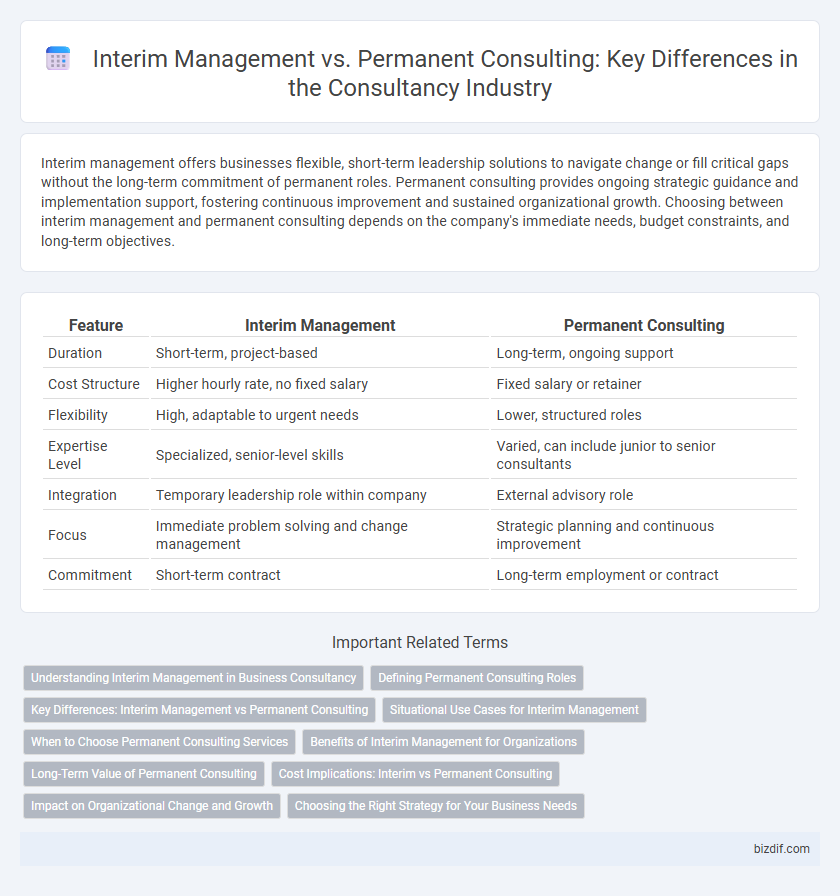Interim management offers businesses flexible, short-term leadership solutions to navigate change or fill critical gaps without the long-term commitment of permanent roles. Permanent consulting provides ongoing strategic guidance and implementation support, fostering continuous improvement and sustained organizational growth. Choosing between interim management and permanent consulting depends on the company's immediate needs, budget constraints, and long-term objectives.
Table of Comparison
| Feature | Interim Management | Permanent Consulting |
|---|---|---|
| Duration | Short-term, project-based | Long-term, ongoing support |
| Cost Structure | Higher hourly rate, no fixed salary | Fixed salary or retainer |
| Flexibility | High, adaptable to urgent needs | Lower, structured roles |
| Expertise Level | Specialized, senior-level skills | Varied, can include junior to senior consultants |
| Integration | Temporary leadership role within company | External advisory role |
| Focus | Immediate problem solving and change management | Strategic planning and continuous improvement |
| Commitment | Short-term contract | Long-term employment or contract |
Understanding Interim Management in Business Consultancy
Interim management in business consultancy offers targeted leadership during transitional periods, providing expertise to manage change, crises, or specific projects without long-term commitment. Unlike permanent consulting roles, interim managers integrate directly into organizational structures, driving immediate results and strategic direction with agility. This approach delivers flexible, high-impact solutions tailored to evolving business needs, optimizing resource allocation and minimizing downtime.
Defining Permanent Consulting Roles
Permanent consulting roles involve long-term engagement where consultants embed deep expertise within the client organization, driving sustained strategic initiatives and fostering continuous improvement. These roles require ongoing collaboration, knowledge transfer, and alignment with corporate culture to ensure lasting impact beyond project completion. Unlike interim management, permanent consulting emphasizes stable presence and capacity building rather than immediate crisis resolution or temporary leadership.
Key Differences: Interim Management vs Permanent Consulting
Interim management involves temporarily filling leadership roles to address urgent business challenges or transitions, emphasizing rapid decision-making and hands-on operational control. Permanent consulting provides ongoing advisory support to improve processes, strategy, and performance without direct management responsibilities. Key differences include contract duration, scope of authority, and the level of commitment to organizational change implementation.
Situational Use Cases for Interim Management
Interim management excels in situations requiring rapid leadership transitions, crisis response, or project-specific expertise unavailable internally, offering flexible, short-term solutions without long-term commitments. Organizations facing sudden executive vacancies or needing turnaround specialists benefit from interim managers who provide immediate impact and specialized skills tailored to urgent business needs. Unlike permanent consulting engagements that focus on ongoing advisory roles, interim management delivers hands-on, operational leadership directly accountable for execution and results within defined timeframes.
When to Choose Permanent Consulting Services
Permanent consulting services are ideal when organizations require long-term strategic support and consistent expertise to drive sustained growth and transformation. Companies facing complex challenges benefit from consultants deeply embedded in their culture, enabling continuous improvement and tailored solutions. Such engagements ensure alignment with evolving business goals and provide ongoing access to specialized knowledge.
Benefits of Interim Management for Organizations
Interim management provides organizations with rapid access to seasoned experts who can address urgent challenges and lead critical projects without the long-term commitment associated with permanent consulting roles. This flexible approach reduces hiring costs, mitigates risks by offering specialized skills during transitional periods, and drives immediate operational improvements through hands-on leadership. Companies benefit from tailored expertise that aligns with strategic goals, enabling agile decision-making and smoother change management processes.
Long-Term Value of Permanent Consulting
Permanent consulting fosters long-term value by embedding deep organizational knowledge and strategic alignment, enhancing sustainable growth and continuous improvement. Unlike interim management, which offers temporary solutions, permanent consultants develop lasting relationships and tailored strategies that adapt over time. This sustained involvement drives cumulative expertise, cultural integration, and proactive innovation critical for long-term success.
Cost Implications: Interim vs Permanent Consulting
Interim management typically incurs higher hourly rates than permanent consulting due to its short-term, specialized nature, yet it offers flexibility by eliminating long-term salary commitments and benefits expenses. Permanent consulting involves ongoing costs such as salaries, bonuses, training, and employee benefits, which accumulate over time, making it more expensive in the long run. Organizations must weigh the immediate cost-efficiency of interim managers against the sustained investment required for permanent consultants when budgeting for consultancy services.
Impact on Organizational Change and Growth
Interim management delivers rapid, high-impact solutions to drive organizational change through targeted expertise and agile decision-making, accelerating growth during transition periods. Permanent consulting fosters long-term strategic development by embedding deep organizational knowledge and continuously evolving business processes. The choice between interim management and permanent consulting depends on the urgency of change, desired sustainability of growth, and the complexity of transformation required.
Choosing the Right Strategy for Your Business Needs
Interim management offers flexible, short-term leadership solutions that address urgent business challenges and enable rapid decision-making, while permanent consulting provides long-term strategic guidance and continuous improvement aligned with the company's vision. Evaluating your organizational goals, budget constraints, and project timelines helps determine whether the agility of interim experts or the sustained partnership of permanent consultants better supports your growth objectives. Selecting the right approach optimizes resource allocation, drives effective change management, and ensures tailored expertise aligns with evolving business needs.
Interim Management vs Permanent Consulting Infographic

 bizdif.com
bizdif.com